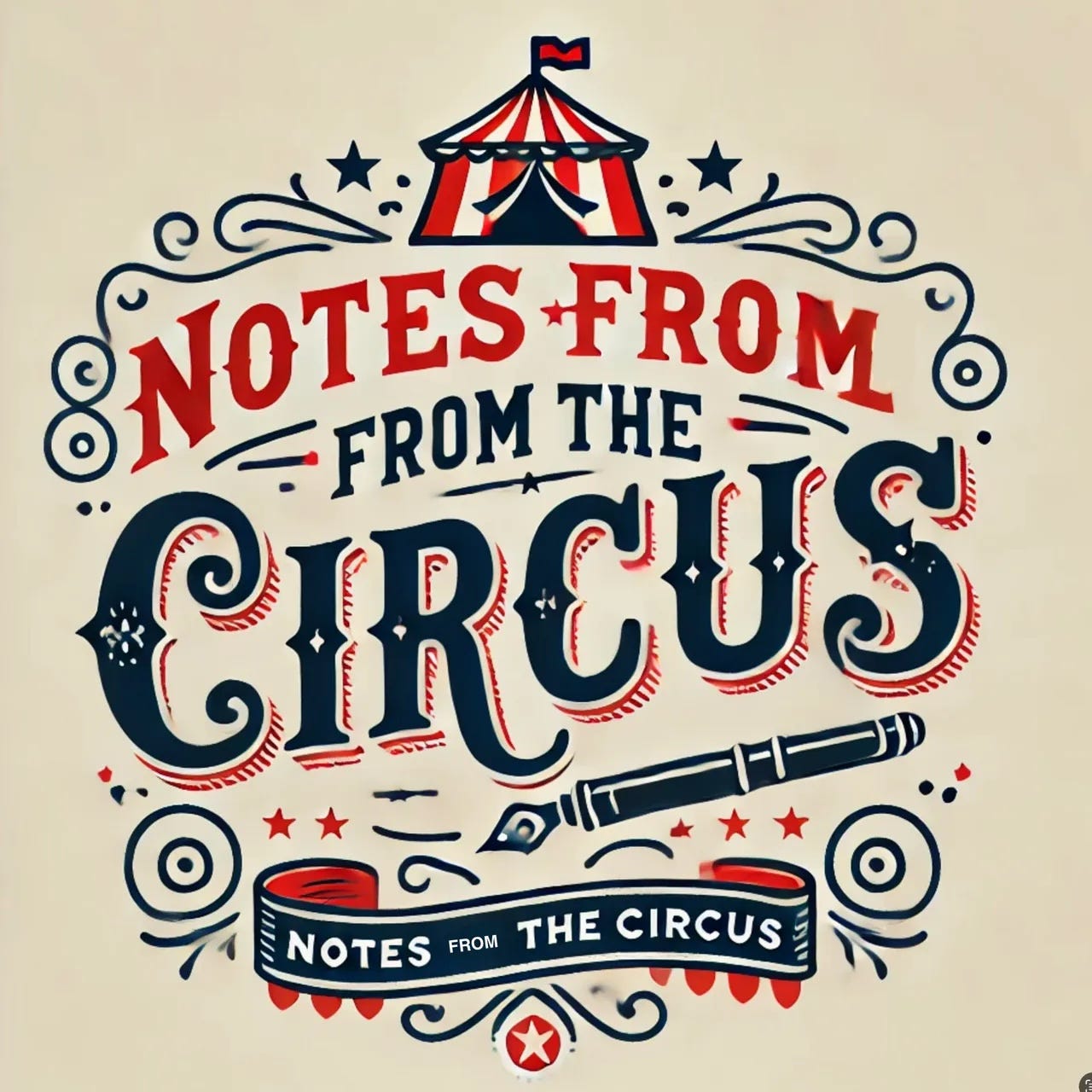On My Writing Style
Because people cannot stop giving me advice on how to improve it

I get feedback about my writing constantly. Too dense. Too long. Too repetitive. The mythopoetic elements are either brilliant or off-putting depending on who’s talking. People tell me an editor would help.
Here’s what I want you to understand: nearly everything people criticize in my writing is deliberate.
I’ve written about this explicitly in my essay on the mythology of Notes from the Circus. What readers experience as repetition, I’m deploying as refrains—cognitive anchors that serve philosophical and pedagogical purposes simultaneously. When I return to “two plus two equals four” or “the wire still holds,” I’m not forgetting I already said it. I’m creating rhythmic structure that helps readers hold onto truth claims while complex reasoning unfolds around them.
What some call meandering, I call showing my work. I’m not just presenting conclusions—I’m demonstrating how to arrive at them. I approach difficult ideas from multiple angles because different minds need different entry points. Some readers grasp concepts analytically. Others need metaphor. Still others need concrete examples. By providing multiple approaches, I’m not being inefficient—I’m being pedagogically inclusive.
This matters because I’m not just trying to inform you. I’m trying to build your capacity to think through complexity yourself. In a world where algorithmic manipulation and sophisticated propaganda are designed to fragment your coherent understanding of reality, I’m offering you cognitive technology—methods for constructing and maintaining frameworks that can resist designed confusion.
That requires showing the actual work of thinking. How to hold multiple considerations in tension. How to test ideas against experience. How to notice when something doesn’t cohere with everything else you know. How to integrate reason and emotion, facts and values, analysis and intuition into frameworks robust enough to withstand epistemic assault.
You cannot learn this from conclusions alone. You have to see the process.
My writing integrates different registers—moving between analytical precision and poetic expression, systematic argument and mythological narrative, observer’s detachment and participant’s commitment. This isn’t stylistic inconsistency. It’s philosophical demonstration. When I argue that meaning emerges from holding creative tension rather than collapsing it, the writing itself must hold those tensions. When I claim that different ways of knowing inform rather than contradict each other, the text must embody that integration.
The form enacts the content. The methodology demonstrates the philosophy. This is mimetic argument—showing rather than merely telling, embodying insights rather than just describing them.
Yes, this demands something from readers that contemporary information environments don’t typically require: sustained attention and active engagement. You can’t skim my essays for extractable conclusions. You have to move through them, building understanding cumulatively, holding pieces in relationship to each other until the larger pattern emerges.
I know this feels demanding in a world optimized for skimming. But I’m explicitly not writing for that mode of consumption. I’m writing for people who recognize that some truths require depth, that complexity can’t always be simplified without being falsified, that learning to think clearly about difficult things is worth the effort it requires.
I’m erudite without apology, but I work to remain accessible. I use philosophical precision when it captures something common language can’t, but I translate, contextualize, ground it in experience. I trust your intelligence enough to follow complex reasoning if I make the steps visible.
Some readers will always want me to be shorter, simpler, more conventional. They want conclusions without reasoning, answers without method, positions without the epistemological frameworks that make those positions defensible.
That’s not what I’m building. I’m doing public philosophy as pedagogy—teaching you not just what to think but how to think. Building your capacity to construct coherent frameworks that can withstand manipulation. Demonstrating that sophisticated thinking can be clear without being simplistic.
The people who need this most are the ones willing to stay with me through the complexity. If that’s you, welcome. The density serves a purpose. The length serves a purpose. The refrains, the mythology, the integration of registers—all of it serves the larger project of building cognitive technology for maintaining human dignity in systems designed to optimize it away.
I’m not interested in being efficient. I’m interested in being clear about complex things. There’s a difference.




Post publishing thought: Now one may argue that I am being self-congratulatory, that I'm rationalizing a deficiency. But I might then observe that this is very much an aesthetic conversation. And if you haven't already noticed, I'm quite the fan of David Hume and Albert Camus.
Keep doing what you are doing, Mike. The refrsins are beautiful, like incantations, and clearly intentional. There is, among literary types in the humanities, a general presumption that the writer is in control of his work and that his choices are very deliberate attempts to reach clearly defined goals . A few writers fail at this, but you do not. For the love of God please ignore requests to shorten or dumb down your writing. Maglafication is not a consummation devoutly to be wished. Stand firm, and hold your ground.
I for one (with 3 advanced degrees) am learning so much from your work to educate those philosophically inclined but without formal training in that field. I am not sure if the following etymology is wholly correct, but e-ducere, to lead out, seems as good a definition of education as any.. and you accomplish this with tact and grace. Thank you for your impeccable writing, your learning, and your courage.